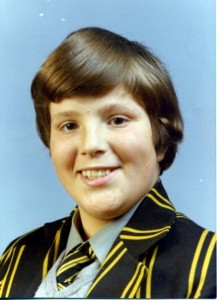 Watching “Father Goose” last night I couldn’t help but think of the early years when I was in Irish boarding school; the rule of conformity where you’re supposed to do what you’re told without question, the quirky relationships, the uniforms. Brought back many a memory.
Watching “Father Goose” last night I couldn’t help but think of the early years when I was in Irish boarding school; the rule of conformity where you’re supposed to do what you’re told without question, the quirky relationships, the uniforms. Brought back many a memory.I’ve always wondered if being exposed to so much gray early in my life left any lasting effects. Sligo Grammar was gray. So was the uniform. Well, the blazer wasn’t – black as I recall, with the school emblem on the breast pocket. And the tie was, what, black with purple and white stripes? Rugby jersey was white with, for some reason, blue stripes. Socks were gray. Shirts, sweater, and trousers, too, though if you wanted to be daring, black trousers were acceptable (and were better suited to hiding shoe polish after a last-second Sunday buffing on the back of the calf).
Portora took a different approach. After forcing us at Gloucester House to look like bees in our black blazers with yellow stripes, they allowed us our own style in the main school. We could wear a plain blazer of our choosing. It’s different at Portora now – they’ve adopted a hybrid black blazer with yellow “highlights”.
I don’t recall any of the masters being like Goody Two-shoes in personality, but there was one or two who sufficed, looks-wise prompting some “Hot for Teacher” feelings in some of the boys, or so I heard. Too many of my classes were taught by grim, wrinkled old guys seemingly longing for the good old days where beating an education into children with a blackthorn stick was the way to go.
But then there’s the flip-side, the human existence outside the rigid discipline. That’s when we were allowed to take off our uniforms and be “normal”. Denim jeans, sneakers (or hiking boots as in my case), and “other than white or gray” shirts didn’t really make that much difference, but it felt like it helped. In the summer we were allowed to shed our jackets and even roll up our sleeves. This presented a challenge as to where to keep the cigarettes.
Fun was whatever was going at the time, I suppose. I remember joining a game of rounders – very much like baseball – on the front hill. I thought that as an American I’d show my Irish peers a thing or two. I whacked the ball and took off running, and even though I was in no danger of being put out, I decided to really impress with a professional-like slide into the base. It worked better than I hoped. The soft sod cushioned my fall, breaking away easily and allowing me to slide effortlessly on the rain-soaked muddy soil beneath. If there’d been prizes for distance and dirt, I’d have won for sure.
There were always little bursts of sunshine between the gray within and without. I’d forgotten that until I wrote my memoir, The Troubles, the coming of age story of how things might have been easier for me had my brother stayed dead the first time, that he didn’t, and that I miss him every single day.
